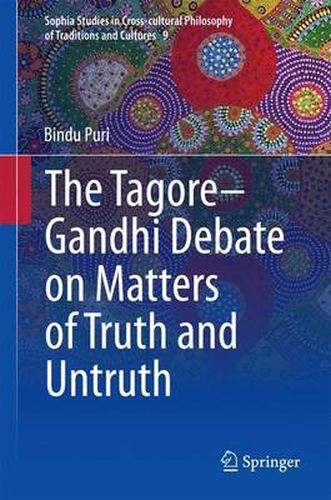Readings Newsletter
Become a Readings Member to make your shopping experience even easier.
Sign in or sign up for free!






This title is printed to order. This book may have been self-published. If so, we cannot guarantee the quality of the content. In the main most books will have gone through the editing process however some may not. We therefore suggest that you be aware of this before ordering this book. If in doubt check either the author or publisher’s details as we are unable to accept any returns unless they are faulty. Please contact us if you have any questions.
Between 1915 and 1941, Tagore (1861-1941) and Gandhi (1869-1948) differed and argued about many things of personal, national, and international significance—satyagraha, non-cooperation, the boycott and burning of foreign cloth, the efficacy of fasting as a means of resistance and Gandhi’s mantra connecting swaraj and charkha . The author tracks the development of this dialogue and argues that the debate was about more fundamental issues, such as the nature of truth and swaraj/freedom and the possibilities of untruth that Tagore saw in Gandhi’s movements for truth and freedom. Puri shows that the differences between the two men’s perspectives came from differently negotiated relationships to (and understandings of) tradition and modernity. Tagore was part of the Bengal renaissance and powerfully influenced by the idea that the Enlightenment consisted in the freedom of the individual to reason for herself. Gandhi, on the other hand, remained close to the Indian philosophical tradition which linked individual freedom to moral progress. Puri points out that Tagore cannot, however, be unreflectively assimilated to the Enlightenment project of Western modernity, for he came fairly close to Gandhi in rejecting the anthropocentricism of modernity and shared Gandhi’s belief in an enchanted cosmos.
The only single-authored volume on the Tagore-Gandhi debate, this book is a welcome addition to the existing literature.
$9.00 standard shipping within Australia
FREE standard shipping within Australia for orders over $100.00
Express & International shipping calculated at checkout
This title is printed to order. This book may have been self-published. If so, we cannot guarantee the quality of the content. In the main most books will have gone through the editing process however some may not. We therefore suggest that you be aware of this before ordering this book. If in doubt check either the author or publisher’s details as we are unable to accept any returns unless they are faulty. Please contact us if you have any questions.
Between 1915 and 1941, Tagore (1861-1941) and Gandhi (1869-1948) differed and argued about many things of personal, national, and international significance—satyagraha, non-cooperation, the boycott and burning of foreign cloth, the efficacy of fasting as a means of resistance and Gandhi’s mantra connecting swaraj and charkha . The author tracks the development of this dialogue and argues that the debate was about more fundamental issues, such as the nature of truth and swaraj/freedom and the possibilities of untruth that Tagore saw in Gandhi’s movements for truth and freedom. Puri shows that the differences between the two men’s perspectives came from differently negotiated relationships to (and understandings of) tradition and modernity. Tagore was part of the Bengal renaissance and powerfully influenced by the idea that the Enlightenment consisted in the freedom of the individual to reason for herself. Gandhi, on the other hand, remained close to the Indian philosophical tradition which linked individual freedom to moral progress. Puri points out that Tagore cannot, however, be unreflectively assimilated to the Enlightenment project of Western modernity, for he came fairly close to Gandhi in rejecting the anthropocentricism of modernity and shared Gandhi’s belief in an enchanted cosmos.
The only single-authored volume on the Tagore-Gandhi debate, this book is a welcome addition to the existing literature.